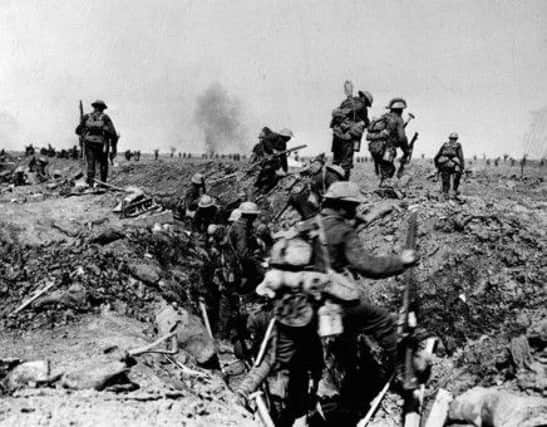Legacies of the Great War as countdown to centenary begins


It was supposed to be the ‘war to end all wars’ and it cast a dark shadow not only over Europe but practically all corners of the world, from North and South America right across to Australia and Japan.
But a century ago, as tens of thousands of men marched cheerily to war they had little idea of the carnage that was to ensue.
Advertisement
Hide AdAdvertisement
Hide AdSome said the fighting would be over by Christmas but instead it dragged on for another four long, harrowing years.
On Monday, the Yorkshire Post, in association with Leeds University’s Legacies of War project, will begin telling the story of the war through the people who lived through it. Every day next week and each week after that we will bring the war to life through a series of stories - everything from tales in the trenches to life on the home front.
Many people paid a high price. By the time the Armistice was signed on the 11th day of the 11th month of 1918, the war had claimed the lives of 10 million people. Britain lost one in 66 of its population, while Germany lost one in 35 and France one in 28.
The war claimed 9,000 lives in Leeds, alone, and on the first day of the Battle of the Somme in 1916 it is said that every street in the city lost one man from the Leeds Pals.
Advertisement
Hide AdAdvertisement
Hide AdSuch numbers are almost impossible to comprehend. Today, there are no longer any survivors still alive who can talk about the Somme and all the other battles that have become synonymous with the horrors of the war.
So why are we commemorating this terrible conflict that finished more than a lifetime ago? We remember the war because it touched so many lives, these were our grandparents and great-grandparents and our great aunts and uncles.
Andrea Hetherington, who is leading a Lottery-funded research project to discover war stories linked to Lawnswood Cemetery in Leeds, said the war changed the world for ever.
“The concept of “total war” is something which today’s generation find difficult to understand as we have largely returned to a series of small wars in far off countries with the occasional repatriated coffin on TV.
Advertisement
Hide AdAdvertisement
Hide Ad“It is very difficult to imagine what it must have been like in 1914, with whole streets of men joining up and a significant proportion of them not returning.
“War is now something we watch on TV – it doesn’t affect what we eat, what time we go to bed, what jobs we do, what we can read in the newspapers or see at the theatre.
“The First World War was the first occasion Britain had been involved in something like this and it had a massive impact on people’s daily lives.”
It was not just a war fought in sodden trenches in “some corner of a foreign field”, to quote the war poet Rupert Brooke, ordinary civilians were also caught up in the most destructive conflict the world had ever seen.
Advertisement
Hide AdAdvertisement
Hide AdFrom the men, women and children killed in Whitby and Scarborough when the German navy bombarded the North East coast, to the 37 “Barnbow Lassies” killed in explosions at Yorkshire’s biggest armaments factory in Leeds while keeping the war effort going.
By the time the guns fell silent in 1918 the Kaiser had been defeated but Britain was a shattered nation. Among those who survived was a belief and a determination that their experiences should not be repeated. This, they felt, was their debt to fallen comrades and in the years that followed there was a solemnity about the commemoration which had a strong impact on the minds of those who had been too young to fight.
The two minute silence quickly became a way of honouring those whose lives were cut short by the war, an act of remembrance that is still carried out today.
It is a poignant reminder of the sacrifice made by so many of the nation’s bravest and best, those who may be long gone but are not forgotten.